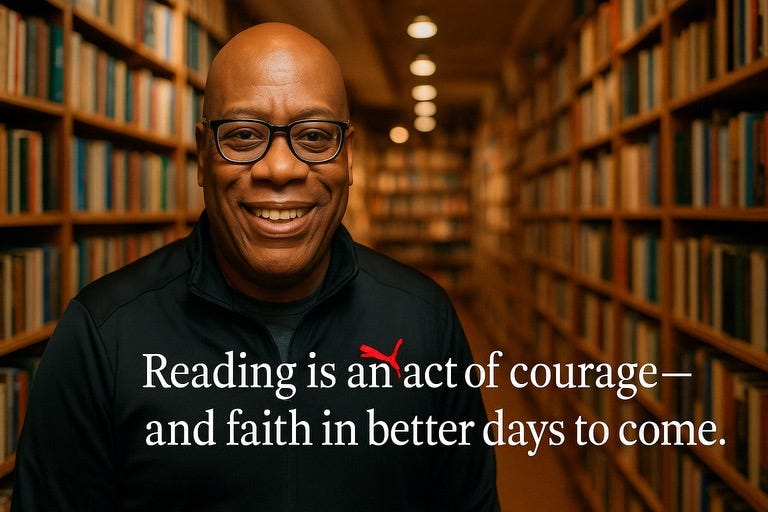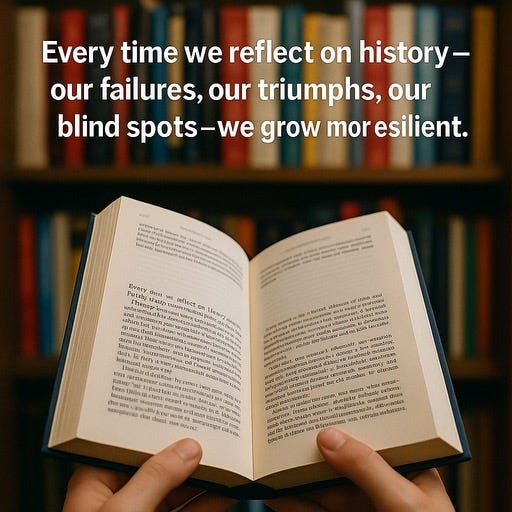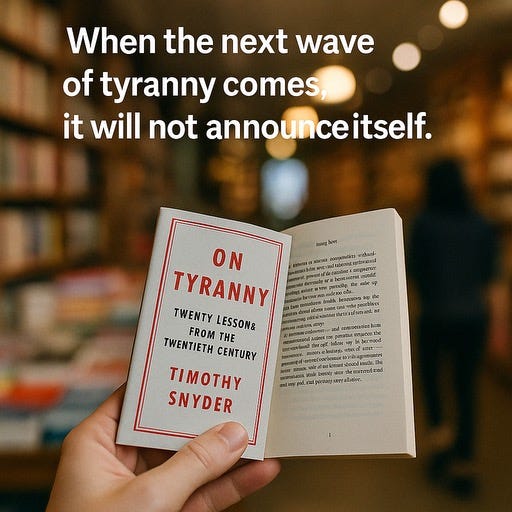There’s a strange stillness that descends over me when I sit and read a book in a public space, especially during these volatile times.
While others scroll endless streams of reactionary content, I’m thumbing through pages of geopolitical predictions, historical warnings, and transhumanist forecasts. It feels almost rebellious, as though I’m pulling away from the numbing gravitational pull of digital distraction and stepping into a dojo for the mind.
In the midst of what I can only describe as a collective American identity crisis—political polarization, economic volatility, algorithmic manipulation, cultural fatigue, and the creeping normalization of authoritarianism—I’ve found refuge not in Netflix or social media doom scrolls, but in books. And not just any books, but those that provoke, challenge, and jolt the brain awake.
I would make the argument that in uncertain times, reading deeply is not just leisure—it is resistance. It is rebellion. And it is preparation.
I’ve been reflecting lately on the historical patterns of reading habits during a crisis. It turns out, when chaos reigns, many retreat into literature.
By way of example, the 2020 pandemic saw a boom in book sales. E-books surged. Audiobook listening hit new highs. Romance and thrillers provided escape. And political nonfiction and social justice manifestos provided meaning.
The same pattern emerged during the Great Recession, and even after 9/11. But in 2024 and now 2025—amid the unsettling echoes of a second Trump run, inflationary pressures, and algorithmic hijacking of public discourse—I sense something different.
There is a paradox in the air……..books have never been more accessible, and yet critical thinking has never felt more endangered.
I don’t say that lightly. And I don’t say it from a high horse. I say it from the inside—deep in the trenches of a culture at war with its own attention span.
We are, it seems, either numbing ourselves with screen-fed outrage or outsourcing our minds to ideological tribes. Reading, especially slow, deliberate reading of books that make us uncomfortable, now feels like the last form of mental sovereignty.
That’s why I’m reading three particular books right now—Peter Zeihan’s The End of the World is Just the Beginning, Timothy Snyder’s On Tyranny, and Ray Kurzweil’s The Singularity Is Nearer. Three radically different worldviews. Three windows into what’s unfolding.
And three reminders that in times of uncertainty—intellectual, cultural, economic, or political, it’s the clarity of your internal compass that matters most.
Let me unpack that.
Peter Zeihan: The Collapse of Globalization and the Illusion of Stability
Zeihan’s book feels like it was written with a matchstick in one hand and a globe in the other. His thesis? The American-led order that has stabilized the world since World War II is unraveling. And with it, the golden age of globalization.
Shipping, supply chains, food systems, energy, manufacturing—all of it is more fragile than we realize. And the U.S.? Well, we may be better off than most, but we’re not immune.
This isn’t speculative fiction. It’s a granular dissection of the systems we’ve long taken for granted. Zeihan isn’t out to create fear but to reveal the realities of what he’s observing.
His folksy, irreverent tone is disarming, but the stakes are clear — the age of cheap, fast, frictionless commerce is ending. We are headed toward a world of fragmentation, resource nationalism, aging populations, and regional desperation.
Reading Zeihan against the backdrop of inflation, tech layoffs, populist uprisings, and global supply chain chaos feels less like analysis and more like prophecy.
The deeper insight, though is that we have become consumers of comfort and efficiency rather than thinkers of contingency and complexity. The collapse of globalization isn’t just an economic shift—it’s a test of intellectual resilience.
All of this becomes a question of whether we can grasp the interplay of geography, demography, and politics without being seduced by easy narratives?
If we can’t, then we’re doomed to be blindsided.
Timothy Snyder: The Fragility of Democracy and the War on Truth
Where Zeihan dissects systems, Snyder dissects souls—specifically, the soul of a democracy under siege. On Tyranny is brief, poetic, and urgent manifesto in 20 lessons, each drawn from the blood-stained ledger of 20th-century authoritarianism.
The Trump era haunts every page of Snyder’s work, even when he doesn’t mention him by name. This is not hyperbole. It is context. It is pattern recognition.
Lesson after lesson lands like a drumbeat: Do not obey in advance. Defend institutions. Be wary of paramilitaries. Believe in truth. Investigate. Stand out. Establish a private life.
What Snyder offers is a primer on mental freedom. A roadmap to staying alert and awake in an age of creeping conformity. Whereas Zeihan warns of the collapse of infrastructure, Snyder warns of the collapse of imagination and moral courage.
And it’s Snyder’s warning that perhaps most resonates with me right now: “History does not repeat, but it does instruct.”
The erosion of language, the normalization of lies, the transformation of professionals into tools of power—these are not historical abstractions. They are living, breathing threats.
In an America where books are being banned in some school districts, where truth is labeled elitist, and where entire media ecosystems are engineered to reinforce tribal narratives, Snyder’s call to read—really read—is revolutionary.
Because when the next wave of tyranny comes, it will not announce itself. It will arrive with a flag, a slogan, and a smile.
Ray Kurzweil: The Coming Merging of Man and Machine
If Zeihan and Snyder are sounding alarms, Kurzweil is offering a different kind of wake-up call—one laced with optimism, awe, and just enough existential dread to keep you up at night.
The Singularity Is Nearer reads like a conversation between a prophet, a physicist, and a Silicon Valley oracle. Kurzweil believes that by 2029, AI will reach human-level intelligence, and soon after, we’ll merge with machines, extend life indefinitely, and reinvent the very notion of consciousness.
It’s the kind of book that makes you stare into space after every chapter, wondering what it means to be human.
What I find most compelling and dangerous about what Kurzweil asserts in his book is how easily we can glide past the ethical implications of this techno-utopia. In a world obsessed with optimization and efficiency, Kurzweil’s vision risks becoming a new gospel for those who already view human frailty as a glitch rather than a feature.
And yet, there’s wisdom in Kurzweil’s foresight. He reminds us that change is not just coming—it’s accelerating. And if we don’t read critically, think deeply, and reflect thoughtfully, we risk becoming passengers in a future we don’t understand and didn’t choose.
Reading Kurzweil alongside Zeihan and Snyder is like triangulating the terrain of our times: one maps the collapse of the old order, one defends the fragile values we must protect, and one charts the strange, shimmering possibilities ahead.
Why Reading Matters Now More Than Ever
So, what does all of this mean?
It means that in this moment—this murky, volatile, paradoxical moment—we need critical readers more than ever. Not just bookworms. Not just armchair theorists. But people willing to do the uncomfortable work of thinking for themselves, questioning orthodoxy, and staying mentally supple as the ground shifts beneath our feet.
We are living in what I call the Atlas Shrugged meets 1984 meets Blade Runner era. Ayn Rand’s warnings about dependency, Orwell’s prophecies about propaganda, and Ridley Scott’s visions of AI convergence—they’re not fiction anymore. They’re ambient.
And yet, we still have agency.
Every time we pick up a book that challenges us instead of pacifies us, we reclaim a piece of our cognitive freedom.
Every time we engage with a difficult idea instead of retreating into confirmation bias, we sharpen the blade of discernment.
And every time we reflect on history—our failures, our triumphs, our blind spots—we grow more resilient.
I believe the act of reading, especially in uncertain times, is an act of spiritual rebellion. It is a declaration: I will not go numb. I will not be manipulated. I will not abandon thought for convenience.
To be a reader today is to be a quiet warrior for clarity in a fog of confusion. To read is to pause long enough to ask: What am I being sold? What am I ignoring? What am I becoming?
A Final Note to Fellow Seekers
If you’re feeling overwhelmed, disoriented, or disillusioned by what’s unfolding around you—good. That means you’re awake.
But don’t let the anxiety paralyze you. Let it mobilize your mind.
The tools we need are within reach. Books like The End of the World Is Just the Beginning, On Tyranny, and The Singularity Is Nearer are not just information—they’re invitations. Invitations to question, to prepare, to imagine, to resist.
In times of empire decline, digital surveillance, and algorithmic echo chambers, the reader becomes the revolutionary. The book becomes the weapon. And the mind becomes the last frontier of freedom.
So keep reading. Keep thinking. And above all, stay human.
If you are finding “Great Books, Great Minds” to be a valuable resource in your polymathic reading journey, then we invite you to join us as a paid member supporter. Or feel free to tip me some coffeehouse love (dirty chai’s are my jam) here if you feel so inclined.
Your contributions are appreciated!
Every bit counts as I strive to deliver high quality feature articles into your inbox on a regular basis. Never any paywalls, just the opportunity to foster community, connection, and conversation one book at a time.









I’ve been a reader my entire life, a seeker, if you will, even when I haven’t known for sure what it is I’m seeking. And at my current age, 75, sometimes I’ve asked myself why I keep reading when there’s little likelihood of passing on what I learn. I realize though, more and more, that what I discover, what I learn, is for me. Knowledge is power even in the current era, maybe even especially important in view of what has been happening to democracy in the United States and also abroad. I may be only one small and rather elderly human being, but I am not alone. There are many other people out there, also learning, reflecting, thinking...and resisting, each of us in our own way.
Sometimes I’ve used reading to escape but as I’ve gotten older, not so much. There is too much out there for me to read, to learn from. So, I follow a bunch of Substacks, favorites being Joyce Vance, Heather Cox Richardson, and Robert Reich...plus many others. Lately I’ve been picking up some “classics” that I’ve skipped over and I’ve rediscovered my passion for reading history. Howard Zinn and his “A People’s History Of The United States” and also his “Voices Of A People’s History Of The United States” should be required reading for anyone trying to understand how we’ve become the country that we are. And Isabel Wilkerson’s “The Warmth Of Other Suns” and “Caste” have further opened up my brain to understanding. There are piles of books in my home awaiting my attention, courtesy of The Dusty Bookshelf, an independent bookstore nearby. I go there with no particular subject or book in mind and the books I need to read unfailingly find me.
Now I have your latest recommendations: Timothy Snyder was already on my radar from his contributions to Substack. I’m not exactly sure about the other two books, but I get the sense that I need to read them for knowledge that I lack.
So, what exactly is my point in all that I’ve written? Maybe it’s the fact that learning should be life long, that it’s a journey that we never complete. And that we never know exactly where or when inspiration will come from, but by being open, new discoveries, different ways of seeing things are always possible. Ultimately, knowledge really is power, personal power and group power...and it leads to growth and understanding.
It's also a good way to recuperate from daily stressors.